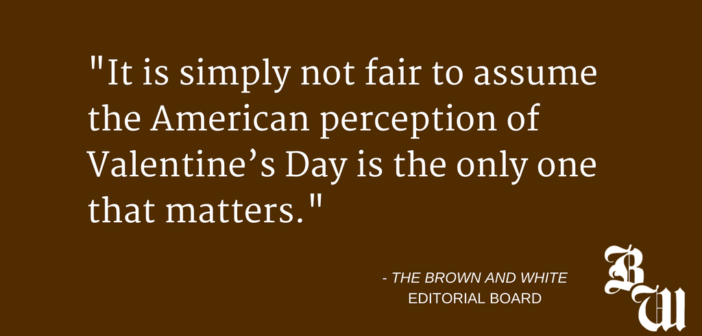In theory, Valentine’s Day is destined to be the most romantic day of the year.
Lovers near and far are encouraged to show appreciation for each other through words, gifts and maybe a little something special at the end of the night.
However, the possibility of that “little something” was met with a harsh ruling out of the Islamabad High Court on Monday in Pakistan’s capital. The predominantly Islamic country effectively banned Valentine’s Day after a petition argued it was against Muslim beliefs.
Contrary to the customary version of the holiday, which is celebrated relatively harmlessly in the U.S., the day is seen by Pakistanis as a catalyst for illegitimate relationships and casual sex between non-partners.
The idea might seem foreign to Americans — and by definition, it is — but surprisingly, it is not the first time Valentine’s Day has been under fire. A handful of countries across the Eurasian continent have either banned or strongly scrutinized the holiday.
Does this mean we should write off these countries as anti-love?
Such an argument is presented in an article by Conservative Review that details each individual country’s situation in relation to the holiday.
However, if you believe in cultural relativism, your answer should be a firm no.
It is simply not fair to assume the American perception of Valentine’s Day is the only one that matters. The religious factors that come in to play, in conjunction with the perceptions of sexual intention combine to create a result that is seen as a bigger deal to other countries than it is to ours.
The problem with trying to fully understand this ruling from a Pakistani side is that it can be disillusioning to think about an issue from both perspectives at the same time.
But there is an easy way to circumvent that: Look at an example of the converse.
How do you think Pakistani Muslims reacted when they heard France, Belgium and the Netherlands banned wearing face covering accessories including the Islamic burqa?
They likely asked on what grounds the ban was being made. And they likely called it ridiculous when the French government stated the following in its law:
“A beach outfit showing in an ostentatious manner a religious affiliation, given that France and religious places are currently the target of terrorist acts, has the nature of creating risks of troubles of public order (mobs, conflicts, etc.) that are necessary to be prevented.”
To them, it is clear their personal religious beliefs are entirely separate entity from terrorist attacks. Just like to the western world, it is clear Valentine’s Day is a separate entity from casual sex.
The two bans are not equitable in their effects, but they are both the result of a cultural misunderstanding or the resistance of a foreign influence.
There is a key difference, however, between the implications of Pakistani law and U.S. law. This difference should not be taken lightly, as it has been a guiding principle for our nation.
Our First Amendment clearly separates church and state. So as much as we can criticize foreign nations for their actions, the most important thing we can do as a country is make sure we hold ourselves accountable.
That’s why we should celebrate the fact a bill proposed by a Georgia lawmaker labeled as a burqa ban was withdrawn a day later.
That’s why we should celebrate the overruling of President Donald Trump’s executive order to ban travel from seven predominantly-Muslim nations.
That’s why we should celebrate…
Whatever’s next.






Comment policy
Comments posted to The Brown and White website are reviewed by a moderator before being approved. Incendiary speech or harassing language, including comments targeted at individuals, may be deemed unacceptable and not published. Spam and other soliciting will also be declined.
The Brown and White also reserves the right to not publish entirely anonymous comments.